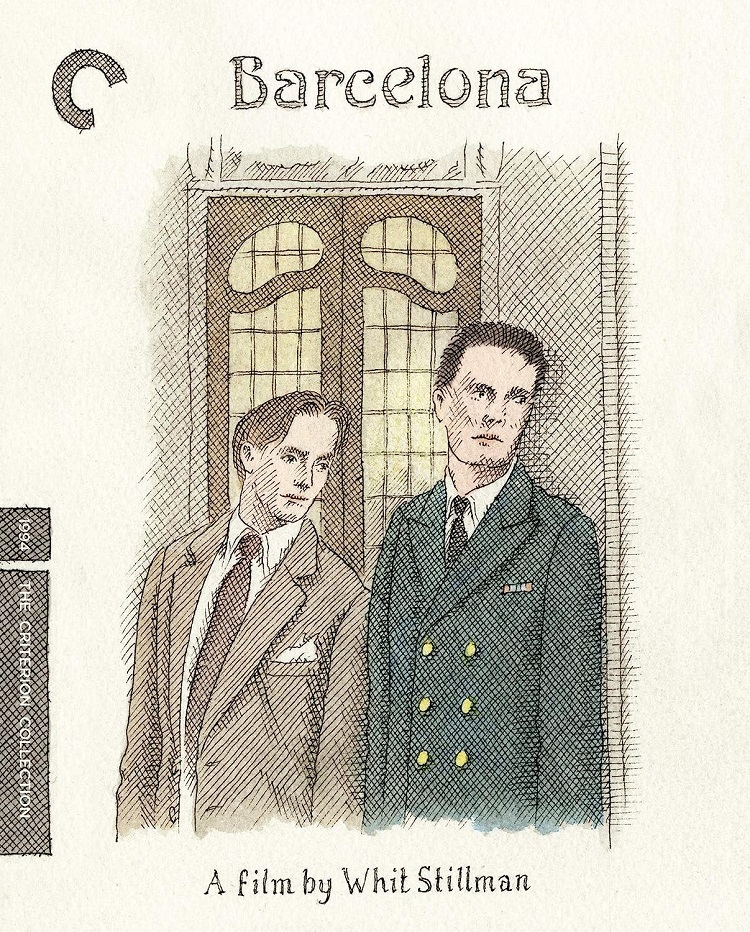
The first thing to get about Barcelona is the movie is sympathetic to its protagonists. Fred and Ted are cousins who haven’t seen eye to eye on anything since Fred stole Ted’s kayak when they were 10 – though Fred says he was only borrowing it, and the thing was a death trap anyway. They bicker. Ted, an expatriate living in Barcelona, is full of pretension and self-consciousness. Fred is a naval officer, sent to Spain ahead of the fleet to plan recreation. He wears his uniform everywhere, is proud of it, and will be damned if all of Barcelona doesn’t respect it.
That’s a tall order in a town that is reaching the height of anti-American feeling just as Spain is debating whether or not to enter NATO. Terrorist bombings and attacks on American buildings are frequent, and Fred is under orders to dress like a civilian in town, but he decides that’s just a guideline, and ignores it (besides, he didn’t pack anything else for the trip). Ted is a salesman who spends his off time reading Dale Carnegie and trying to convince himself that he prefers, in his words, “plain, or even homely girls”. He resents everything about Fred, especially his crashing Ted’s apartment while he’s in town.
While the pair have an essentially obnoxiousness, the film does not look down on them as American buffoons. The anti-American arguments they meet are platitudinous or farcically conspiratorial (one journalist tells them the shadowy organization the “AFL-CIA” and Joseph McCarthy conspired to suppress labor unions in Europe). The Americans are silly and glib, the Europeans are smug and sometimes vindictive. A great combination for a romantic comedy with late night parties and dancing.
Barcelona is Whit Stillman’s second film. His first, Metropolitan, was about debutante balls and the rich yuppies for whom the balls are the heart of their social life, as seen through the eyes of a down-on-his luck kid from the Westside who more or less accidentally gets roped into high society. It has the elements to make a snobs vs slobs comedy, but Stillman’s affection for his characters is too great for that. Similarly, in Barcelona the politics his characters argue (and they spend a lot of their time arguing) is less important than the characteristics of the people speaking them. Ted wants to explain, Fred wants to defend. When a woman complains that shootings prove Americans are more violent than other people, Fred says, “We’re just better shots.”
However contentious things get in their lives, small moments of grace punctuate the film. While reading the Bible (hidden behind an issue of The Economist) Ted dances frenetically to Glenn Miller. One their way to a date, he and Fred just happen to spy their girls practicing a Flamenco dance, and it’s totally enchanting. Dancing figures prominently in Whit Stillman’s movies, since they are largely about people pairing up. Ted and Fred are delighted that the sexual revolution came late to Spain, so they’re surrounded by beautiful, promiscuous girls, but are less excited for that promiscuity to extend to other fellas.
The partying and dancing and promiscuity takes a darker turn in the third act when, spurred on by the best joke in the movie where Ted relates American foreign policy to ant colonies, an anti-America journalist pegs Fred as a CIA agent, which is just inconvenient, until someone tries to assassinate him. In many comedies, this turn would probably sour the tone of the movie irredeemably. But Whit Stillman is a master of his own particular, peculiar tone. His stories are comedies of manners in a world quickly losing any sense of what manners are. In their happiest moments and funniest scenes they’re still suffused with a melancholy: it’s a lost world he’s depicting, and even if you don’t want to like the characters, they’re still people, losing something real in that world.
Stillman’s comedies are funny, clever, amusing, though not routinely hilarious. They reward careful attention to the dialogue, and if approached over-casually might seem empty or random. Which might seem to defeat the point of sitting back and watching a comedy. I find their indelible warmth to be engaging, and I enjoy the basic conviction that even the least likable people are still human, and have something worthwhile about them.
As a Criterion Collection release, this Barcelona Blu-ray is loaded with extra features. There’s a commentary with Whit Stillman and his principal actors, Chris Eigeman and Taylor Nichols, detailing locations and some of the challenges of working in Spain. It was recorded in 2002. Besides a trailer, some deleted scenes and an alternate ending (all of which seemingly look like they were ported from an ancient VHS) there are numerous bits of archival footage from around the time Barcelona was released: a Today show interview with Whit Stillman, an entire episode of The Dick Cavett Show, a very short (5 minute) contemporary featurette, and an insightful video essay tying together the unifying themes from Stillman’s triptych of films, Metropolitan, Barcelona, and The Last Days of Disco.